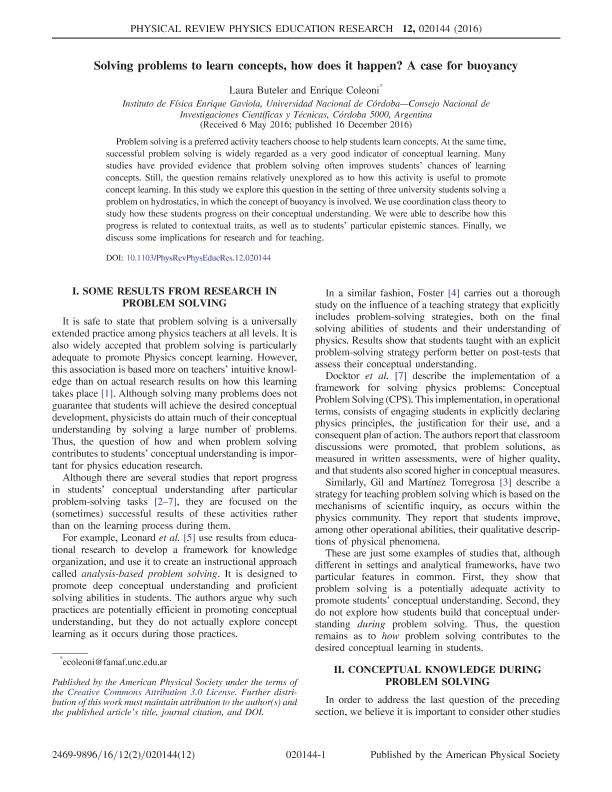Mostrar el registro sencillo del ítem
dc.contributor.author
Buteler, Laura Maria

dc.contributor.author
Coleoni, Enrique Andres

dc.date.available
2023-01-27T17:13:37Z
dc.date.issued
2016-11
dc.identifier.citation
Buteler, Laura Maria; Coleoni, Enrique Andres; Solving problems to learn concepts, how does it happen?: A case for buoyancy; American Physical Society; Physical Review Physics Education Research; 12; 2; 11-2016; 1-12
dc.identifier.issn
2469-9896
dc.identifier.uri
http://hdl.handle.net/11336/185987
dc.description.abstract
Problem solving is a preferred activity teachers choose to help students learn concepts. At the same time, successful problem solving is widely regarded as a very good indicator of conceptual learning. Many studies have provided evidence that problem solving often improves students' chances of learning concepts. Still, the question remains relatively unexplored as to how this activity is useful to promote concept learning. In this study we explore this question in the setting of three university students solving a problem on hydrostatics, in which the concept of buoyancy is involved. We use coordination class theory to study how these students progress on their conceptual understanding. We were able to describe how this progress is related to contextual traits, as well as to students' particular epistemic stances. Finally, we discuss some implications for research and for teaching.
dc.format
application/pdf
dc.language.iso
eng
dc.publisher
American Physical Society

dc.rights
info:eu-repo/semantics/openAccess
dc.rights.uri
https://creativecommons.org/licenses/by-nc-sa/2.5/ar/
dc.subject
problem solving
dc.subject
concept learning
dc.subject
buoyancy
dc.subject
development
dc.subject.classification
Otras Ciencias de la Educación

dc.subject.classification
Ciencias de la Educación

dc.subject.classification
CIENCIAS SOCIALES

dc.title
Solving problems to learn concepts, how does it happen?: A case for buoyancy
dc.type
info:eu-repo/semantics/article
dc.type
info:ar-repo/semantics/artículo
dc.type
info:eu-repo/semantics/publishedVersion
dc.date.updated
2023-01-27T16:36:47Z
dc.journal.volume
12
dc.journal.number
2
dc.journal.pagination
1-12
dc.journal.pais
Estados Unidos

dc.journal.ciudad
New York
dc.description.fil
Fil: Buteler, Laura Maria. Consejo Nacional de Investigaciones Científicas y Técnicas. Centro Científico Tecnológico Conicet - Córdoba. Instituto de Física Enrique Gaviola. Universidad Nacional de Córdoba. Instituto de Física Enrique Gaviola; Argentina
dc.description.fil
Fil: Coleoni, Enrique Andres. Consejo Nacional de Investigaciones Científicas y Técnicas. Centro Científico Tecnológico Conicet - Córdoba. Instituto de Física Enrique Gaviola. Universidad Nacional de Córdoba. Instituto de Física Enrique Gaviola; Argentina
dc.journal.title
Physical Review Physics Education Research
dc.relation.alternativeid
info:eu-repo/semantics/altIdentifier/url/http://journals.aps.org/prper/about
dc.relation.alternativeid
info:eu-repo/semantics/altIdentifier/doi/http://dx.doi.org/ 10.1103/PhysRevPhysEducRes.12.020144
Archivos asociados
